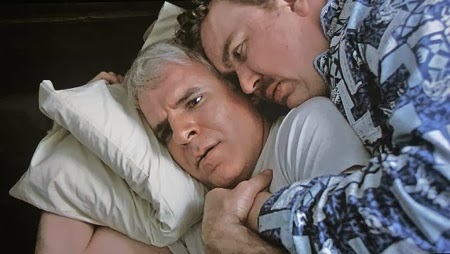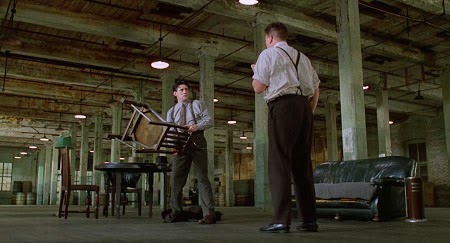4/5
Sutter (Miles Teller) is a high school senior who decides to get drunk after a break-up with his girlfriend Cassidy (Brie Larson). Suddenly awoken on a stranger's lawn by paper girl Aimee (Shailene Woodley), he helps with her deliveries while he attempts to locate his car. Love blossoms between the two and Sutter attempts to live in the moment while also at the same time is constantly reminded of the approaching future.
2013 was an interesting and great year for movies. It brought us several apocalyptic (and post-apoc) films (Oblivion, After Earth, The World's End, This is the End) but it also delivered a handful of coming-of-age films (The Way Way Back, The Kings of Summer) including The Spectacular Now. Directed by James Ponsoldt (Off the Black, Smashed) and written by Scott Neustadter and Michael H. Weber (500 Days of Summer), Spectacular stands out from the others because of one discernible difference: they were able to effectively capture young love in it's purest form from synthesis to progression. That point in a teenager's life where it's an all-consuming thing. When it appears during strange coincidences, with surprising people, and sometimes to the surprise of peers. They are able to capture the innocence and vulnerability of it with much help from the two stars Teller (Project X, Footloose (the remake) and Woodley (The Descendants). Sutter's character is conflicting at times but that may be because he's identifiable. He has this pseudo-alpha never-take-anything-too-seriously approach to everything but at the end of the day he's terrified about the future, unsure of who is going to become while feeling pressured by the people around him. Terrified of repeating the same mistakes of his parents. When he opens his eyes and sees Aimee standing over him, the new chapter is immediately opened. And while parts of his past may linger, things have already changed and will continue changing. Sutter has to live through some of the defining moments of his life. He needs to have his heart broken, needs to meet his estranged father, needs to question the deficiencies in his mother's parenting. The camera is there to capture it. Shailene Woodley nails it with her outstanding performance as the insecure bookworm, surprised to find herself in the eyes of the popular Sutter. You buy into their connection immediately and the rest of the film plays out really well with the necessary ebbs and flows of a romantic drama with some sudden and difficult turns along the way.
Sutter (Miles Teller) is a high school senior who decides to get drunk after a break-up with his girlfriend Cassidy (Brie Larson). Suddenly awoken on a stranger's lawn by paper girl Aimee (Shailene Woodley), he helps with her deliveries while he attempts to locate his car. Love blossoms between the two and Sutter attempts to live in the moment while also at the same time is constantly reminded of the approaching future.
2013 was an interesting and great year for movies. It brought us several apocalyptic (and post-apoc) films (Oblivion, After Earth, The World's End, This is the End) but it also delivered a handful of coming-of-age films (The Way Way Back, The Kings of Summer) including The Spectacular Now. Directed by James Ponsoldt (Off the Black, Smashed) and written by Scott Neustadter and Michael H. Weber (500 Days of Summer), Spectacular stands out from the others because of one discernible difference: they were able to effectively capture young love in it's purest form from synthesis to progression. That point in a teenager's life where it's an all-consuming thing. When it appears during strange coincidences, with surprising people, and sometimes to the surprise of peers. They are able to capture the innocence and vulnerability of it with much help from the two stars Teller (Project X, Footloose (the remake) and Woodley (The Descendants). Sutter's character is conflicting at times but that may be because he's identifiable. He has this pseudo-alpha never-take-anything-too-seriously approach to everything but at the end of the day he's terrified about the future, unsure of who is going to become while feeling pressured by the people around him. Terrified of repeating the same mistakes of his parents. When he opens his eyes and sees Aimee standing over him, the new chapter is immediately opened. And while parts of his past may linger, things have already changed and will continue changing. Sutter has to live through some of the defining moments of his life. He needs to have his heart broken, needs to meet his estranged father, needs to question the deficiencies in his mother's parenting. The camera is there to capture it. Shailene Woodley nails it with her outstanding performance as the insecure bookworm, surprised to find herself in the eyes of the popular Sutter. You buy into their connection immediately and the rest of the film plays out really well with the necessary ebbs and flows of a romantic drama with some sudden and difficult turns along the way.













































